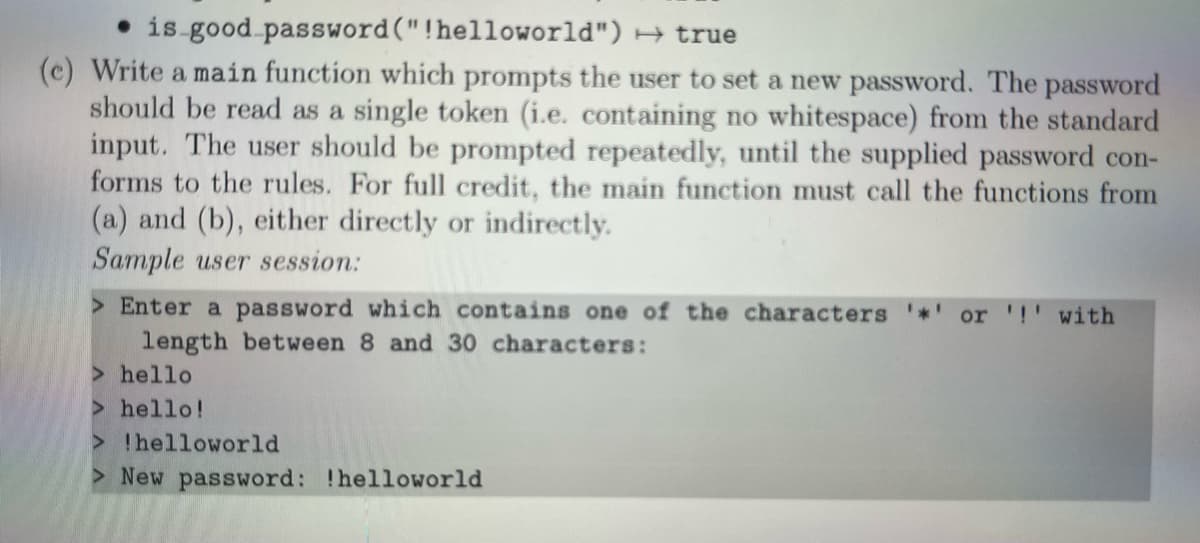O Write a main function which prompts the user to set a new password. The password should be read as a single token (i.e. containing no whitespace) from the standard input. The user should be prompted repeatedly, until the supplied password con- forms to the rules. For full credit, the main function must call the functions from (a) and (b), either directly or indirectly. Sample user session:
O Write a main function which prompts the user to set a new password. The password should be read as a single token (i.e. containing no whitespace) from the standard input. The user should be prompted repeatedly, until the supplied password con- forms to the rules. For full credit, the main function must call the functions from (a) and (b), either directly or indirectly. Sample user session:
Computer Networking: A Top-Down Approach (7th Edition)
7th Edition
ISBN:9780133594140
Author:James Kurose, Keith Ross
Publisher:James Kurose, Keith Ross
Chapter1: Computer Networks And The Internet
Section: Chapter Questions
Problem R1RQ: What is the difference between a host and an end system? List several different types of end...
Related questions
Question
In c++language
Please only answer questions c, it’s related to question a and b
![(a) Write a function which returns true if a C-string contains a given character, false
if the character is not present. Its exact declaration should be:
bool contains_char(char cstring[], char target)
The function should contain no cout statements.
You may use strlen, but not strchr or std::string.find.
Here are some test cases:
• contains char("", ’ a') → false
• contains_char("a", 'a') → true
• contains_char("hello", 'h’) → true
• contains_char("hello", 'e') H true
• contains_char("hello", 'o') → true
• contains_char("hello", '!’) H false
(b) Write a function which determines if a given C-string is a valid password, that is,
if it meets all of the following criteria:
• length between 8 and 30 characters
• contains the character '*' or '!’
For full credit, this function must call contains char in its implementation. Its
exact declaration should be:
bool is good_password (char cstring [])
The function should contain no cout statements.
Here are some test cases:
• is good password ("") false
• is-good-password("hello") → false
• is-good.password ("hello!") false
• is good.password("h*1loworld") true
• is-good-password("!helloworld") true](/v2/_next/image?url=https%3A%2F%2Fcontent.bartleby.com%2Fqna-images%2Fquestion%2F50dee9fd-c842-4c78-b313-0b52af8adedd%2F18d30a77-9567-4b72-973a-cb11770f7016%2Fxjup7d_processed.jpeg&w=3840&q=75)
Transcribed Image Text:(a) Write a function which returns true if a C-string contains a given character, false
if the character is not present. Its exact declaration should be:
bool contains_char(char cstring[], char target)
The function should contain no cout statements.
You may use strlen, but not strchr or std::string.find.
Here are some test cases:
• contains char("", ’ a') → false
• contains_char("a", 'a') → true
• contains_char("hello", 'h’) → true
• contains_char("hello", 'e') H true
• contains_char("hello", 'o') → true
• contains_char("hello", '!’) H false
(b) Write a function which determines if a given C-string is a valid password, that is,
if it meets all of the following criteria:
• length between 8 and 30 characters
• contains the character '*' or '!’
For full credit, this function must call contains char in its implementation. Its
exact declaration should be:
bool is good_password (char cstring [])
The function should contain no cout statements.
Here are some test cases:
• is good password ("") false
• is-good-password("hello") → false
• is-good.password ("hello!") false
• is good.password("h*1loworld") true
• is-good-password("!helloworld") true

Transcribed Image Text:• is good password("!helloworld") → true
(c) Write a main function which prompts the user to set a new password. The password
should be read as a single token (i.e. containing no whitespace) from the standard
input. The user should be prompted repeatedly, until the supplied password con-
forms to the rules. For full credit, the main function must call the functions from
(a) and (b), either directly or indirectly.
Sample user session:
> Enter a password which contains one of the characters
length between 8 and 30 characters:
> hello
> hello!
> !helloworld
> New password: !helloworld
or '!' with
Expert Solution
This question has been solved!
Explore an expertly crafted, step-by-step solution for a thorough understanding of key concepts.
Step by step
Solved in 3 steps with 2 images

Recommended textbooks for you

Computer Networking: A Top-Down Approach (7th Edi…
Computer Engineering
ISBN:
9780133594140
Author:
James Kurose, Keith Ross
Publisher:
PEARSON

Computer Organization and Design MIPS Edition, Fi…
Computer Engineering
ISBN:
9780124077263
Author:
David A. Patterson, John L. Hennessy
Publisher:
Elsevier Science

Network+ Guide to Networks (MindTap Course List)
Computer Engineering
ISBN:
9781337569330
Author:
Jill West, Tamara Dean, Jean Andrews
Publisher:
Cengage Learning

Computer Networking: A Top-Down Approach (7th Edi…
Computer Engineering
ISBN:
9780133594140
Author:
James Kurose, Keith Ross
Publisher:
PEARSON

Computer Organization and Design MIPS Edition, Fi…
Computer Engineering
ISBN:
9780124077263
Author:
David A. Patterson, John L. Hennessy
Publisher:
Elsevier Science

Network+ Guide to Networks (MindTap Course List)
Computer Engineering
ISBN:
9781337569330
Author:
Jill West, Tamara Dean, Jean Andrews
Publisher:
Cengage Learning

Concepts of Database Management
Computer Engineering
ISBN:
9781337093422
Author:
Joy L. Starks, Philip J. Pratt, Mary Z. Last
Publisher:
Cengage Learning

Prelude to Programming
Computer Engineering
ISBN:
9780133750423
Author:
VENIT, Stewart
Publisher:
Pearson Education

Sc Business Data Communications and Networking, T…
Computer Engineering
ISBN:
9781119368830
Author:
FITZGERALD
Publisher:
WILEY